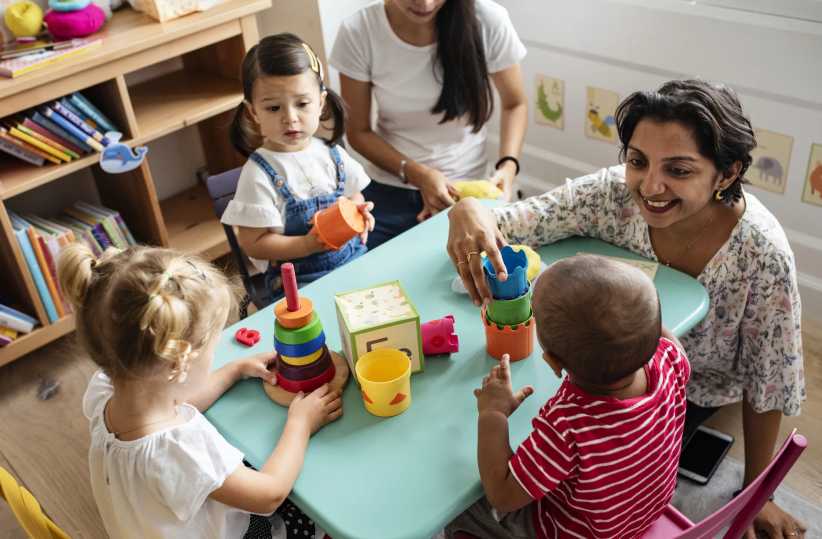Your adorable infant has
morphed into a runaway train of unfamiliar desires, needs, and abilities. And
the parent who had everything under control starts to feel as helpless as,
well, a baby. The following insights won’t change what your toddler is like,
but may change how you relate to him.
1. “Me do it!” is their
mantra. Whether it’s putting on her shoes, pouring her cereal, or performing a
dozen other daily tasks, your toddler wants to do it herself. “A toddler’s
sense of autonomy and competence begins to build right after she has mastered
walking,” says Alicia Lieberman, Ph.D., author of “The Emotional Life of the
Toddler.” “She starts to think, ‘If I can do this, I can do other things too.’”
Whenever possible, you should let her.
2. Limits spell love.
Despite their budding independence, toddlers are easily overwhelmed by new
situations and emotions (which are rife at this age). Young children need
structure to their day as well as clear and consistent messages about what they
can and cannot do. “Limits make a child feel secure,” says Heidi Murkoff,
coauthor of “What To Expect: The Toddler Years.” But limits must be
age-appropriate. “Don’t expect a two-year-old to sit quietly in Church,” she
cautions. “It won’t happen.”
3. The term “picky eater”
could have been coined for them. There probably isn’t a parent alive who hasn’t
fretted about her toddler’s nutrition. Relax. “The typical 2- or 3-year-old has
what we call ‘the beige diet,’ consisting of foods like bread and pasta,” says
Pamela Zuckerman, M.D., a pediatrician in Brookline, MA. “As long as your child
eats a couple of items from each food group, he’ll be fine. And if he wants a
grilled cheese every day for lunch, let him have it. It’s nutritious—and
pressuring him to diversify will only backfire.
4. Their inquiring minds
want to know. Toddlers are inherently curious and understand much more than
they can verbalize. Once their language skills start to blossom, they will
pepper you with questions. “My 2 1/2-year-old is always asking, ‘What that
do?’” says Lori Hertz, a mother of two. “And he loves to take ‘the whys’ as far
as they’ll go. ‘It’s raining.’ ‘Why?’ ‘It’ll make the grass grow.’ ‘Why?’ ‘The
grass needs to drink.’ ‘Why?’ It’s a game with him.”
5. Just because something is
imaginary doesn’t make it less real. Toddlers have vivid fantasy lives and
delight in make believe. But as your child’s imagination begins to soar, so
will her fears, anxieties, and nightmares. Don’t belittle or dismiss them. “If
your child says there’s a witch under the bed, tell her you shooed it out the
window, so it’s okay to go back to sleep,” advises Judith Goldstein, M.D., a
popular pediatrician on the Upper East Side.
6. Sharing isn’t their
thing. Toddlers enjoy playing near each other, screeching together, and singing
and dancing in groups. But don’t expect them to willingly part with their toys.
“Sharing doesn’t come naturally,” says Suzanna Kaplan, an elementary school
principal in Teaneck, N.J. While young children should be told about turn
taking and not snatching playthings, the best way to insure a good play date,
Kaplan says, is to provide toys for everyone.
7. Language liberates them.
By talking and reading to your child every day, you teach him verbal skills,
which in turn help him to manage his emotions. “Children who don’t know how to
put feelings into words enact them instead,” Dr. Lieberman says. “So rather
than say, ‘Give me,’ they take; rather than say, ‘I’m mad at you,’ they hit.”
8. Toddlers get tired. Sleep
is as important for your growing toddler as it was when he was a newborn, but
now he’ll resist it. “Parents must stick to a regular bedtime routine,” Dr.
Zuckerman says. “Your child will try all sorts of evasive tactics—more water,
another story—but you need to stand firm. You’re just putting off the
inevitable, and besides, your child needs to rest.” Most toddlers sleep through
the night and take an afternoon nap for a total of about 13 hours of sleep a
day.
9. Toddlers just want to
have fun. The daily meltdowns notwithstanding, kids this age get a huge kick
out of life. To them, it’s an endless banquet of slides and swings, crayons and
dolls, hugs and kisses. Plus, they get to experience many simple pleasures,
like picnics and carousels, for the first time. “When I play chase with my
2-year-old, she’s the happiest kid in the world,” says Rebecca Tayne.
10. Time has no meaning for
them. The leisurely way in which toddlers do almost everything—from getting
dressed to eating lunch—inevitably taxes the patience of harried parents. But
toddlers cannot be rushed. Instead, build extra time into every activity. When
that’s impossible, try using games or distractions, such as a race to get
dressed before a song ends.
11. They’re control freaks.
Toddlers know what they like, and they can’t easily be talked out of their
choices: sitting in a particular seat, drinking from a certain cup. Yet this
apparent stubbornness is a young child’s way of exerting some control over his
world, to make it less intimidating and more manageable. While you can
sometimes avert a tantrum by distracting him or giving him a choice instead of
a command, shrewd parents pick their battles. “If my daughter insists on winter
boots in summertime, fine,” says Sue Hanish. “If she refuses to get in the car
seat, that’s another story.”
12. Every toddler is a
unique and interesting individual. Everyone has a different personality and
psychology, of course, and those differences really start to surface during
toddlerhood. Your child will reveal specific talents, interests, and character
traits, excelling in some areas, lagging in others, and changing all the time.
Whether a child is shy or outgoing, athletic or artistic, wise parents love her
for who she is, not who they want her to be. And that’s as true at 18 months as
it is at 18 years.
%uFFFD













